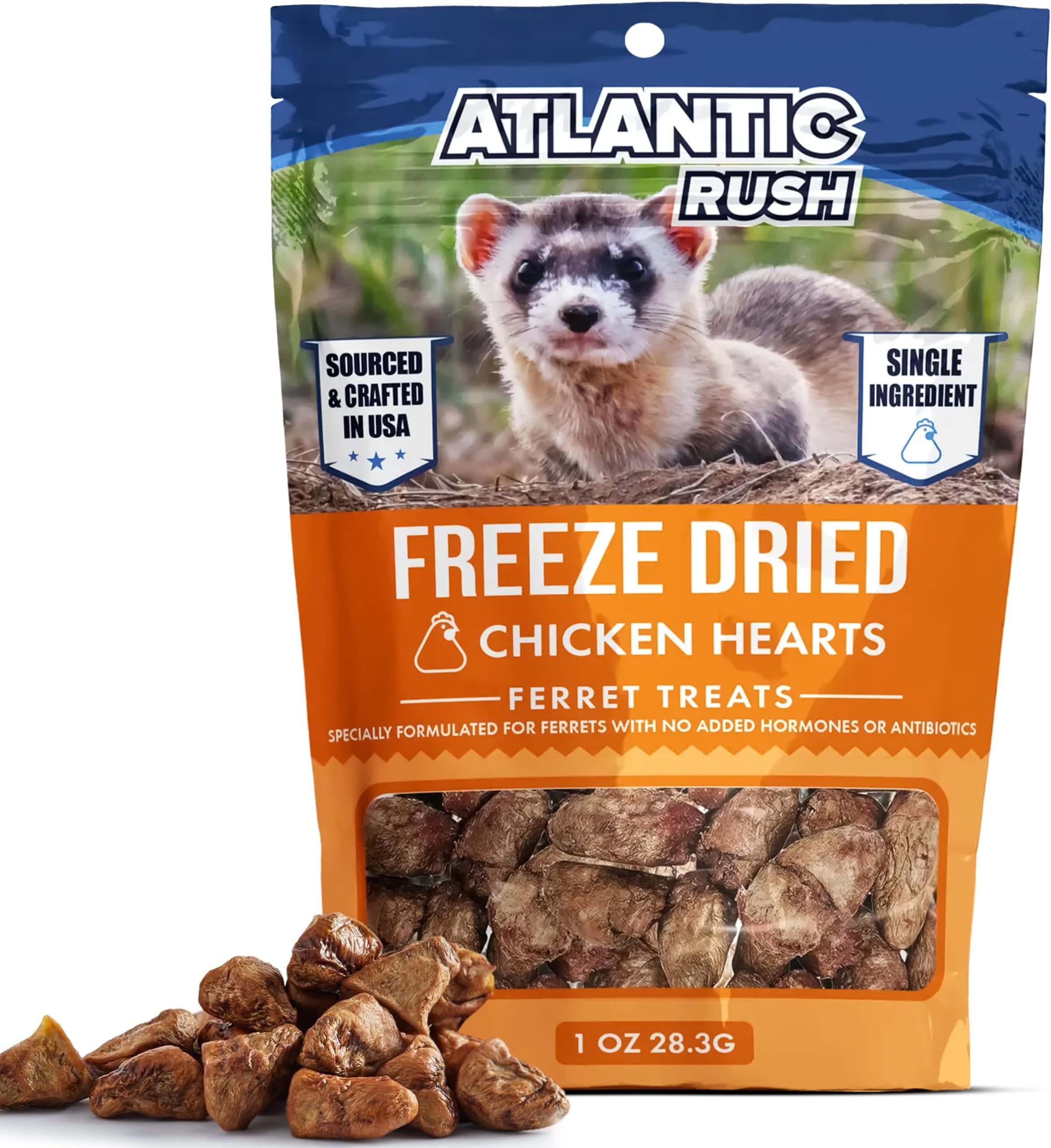
Natural Treats for Ferrets with Sensitive Digestion: A Guide to Gentle and Delicious Options
Ferrets, with their playful antics and curious nature, make wonderful pets. However, they can sometimes present unique challenges, particularly when it comes to their diet. Ferrets have a relatively short digestive tract and a sensitive system, making them prone to digestive upset if fed inappropriate foods. This is especially true for ferrets with known sensitivities or a history of digestive issues.
Treats are an important part of bonding with your ferret and enriching their lives. However, it’s crucial to choose treats that are not only appealing but also gentle on their digestive system. This article will explore the world of natural treats for ferrets with sensitive digestion, providing guidance on what to look for, what to avoid, and offering some delicious and safe options.
Understanding Ferret Digestion
Before diving into specific treat options, it’s important to understand the basics of ferret digestion:
- Obligate Carnivores: Ferrets are obligate carnivores, meaning their bodies are designed to primarily digest and utilize animal-based proteins and fats. They lack the necessary enzymes to efficiently process plant-based carbohydrates and fiber.
- Short Digestive Tract: Ferrets have a short digestive tract, which means food passes through their system relatively quickly. This limits their ability to ferment and extract nutrients from plant matter.
- High Protein and Fat Requirements: Ferrets require a diet that is high in animal protein (30-40%) and fat (18-30%). These nutrients provide the energy and building blocks they need to thrive.
- Susceptibility to Digestive Upset: Due to their unique digestive physiology, ferrets are prone to digestive upset if fed foods that are high in carbohydrates, sugar, or fiber. These can lead to issues like diarrhea, vomiting, and even more serious conditions.
Identifying a Ferret with Sensitive Digestion
Some ferrets are naturally more prone to digestive sensitivities than others. Here are some signs that your ferret might have a sensitive digestive system:
- Frequent Diarrhea or Loose Stools: This is one of the most common signs of digestive upset in ferrets.
- Vomiting or Regurgitation: Frequent vomiting or regurgitation can indicate an underlying digestive issue.
- Loss of Appetite: If your ferret suddenly loses interest in food, it could be a sign of discomfort or illness.
- Lethargy or Weakness: A ferret with digestive issues may be less active and appear weak.
- Weight Loss: If your ferret is losing weight despite eating, it could indicate that they are not absorbing nutrients properly.
- Changes in Stool Consistency or Color: Keep an eye out for any changes in the consistency, color, or odor of your ferret’s stool.
- Increased Gas or Bloating: Excessive gas or bloating can be a sign of digestive problems.
If you notice any of these signs, it’s important to consult with a veterinarian who is experienced in treating ferrets. They can help diagnose the underlying cause of the digestive issues and recommend appropriate treatment options.
Treat Ingredients to Avoid
When choosing treats for a ferret with sensitive digestion, it’s crucial to avoid ingredients that can trigger digestive upset. Here are some common culprits:
- Grains and Cereals: Corn, wheat, soy, and other grains are difficult for ferrets to digest and can cause digestive upset.
- Sugars and Sweeteners: Sugar, honey, corn syrup, and other sweeteners can disrupt the balance of bacteria in the gut and lead to digestive problems.
- Fruits and Vegetables: While some fruits and vegetables are safe in very small amounts, they are generally not well-digested by ferrets and can cause diarrhea.
- Dairy Products: Ferrets are lactose intolerant, so dairy products like milk, cheese, and yogurt should be avoided.
- Artificial Colors, Flavors, and Preservatives: These additives can irritate the digestive system and should be avoided whenever possible.
- Chocolate: Chocolate is toxic to ferrets and should never be given as a treat.
Natural Treat Options for Sensitive Ferrets
Now that we’ve covered what to avoid, let’s explore some natural treat options that are gentle and safe for ferrets with sensitive digestion:
-
Freeze-Dried Meat Treats:
- These treats are made from pure meat that has been freeze-dried to remove moisture. This process preserves the nutrients and flavor of the meat without adding any artificial ingredients or preservatives.
- Good options include freeze-dried chicken, turkey, lamb, or rabbit.
- Make sure the treats are made from a single source of protein to help identify any potential allergies.
- Why they’re good: High in protein, easily digestible, and free from grains, sugars, and artificial additives.
-
Cooked Meat (Plain):
- Small pieces of cooked, unseasoned meat can be a great treat for ferrets.
- Boiled chicken, turkey, or lamb are good choices.
- Ensure the meat is thoroughly cooked and free from bones, skin, or excessive fat.
- Why they’re good: Provides a natural source of protein, easily digestible, and can be tailored to your ferret’s preferences.
-
Meat-Based Baby Food (Limited):
- Meat-based baby food, such as chicken or turkey, can be a good option, but it should be given in very small amounts.
- Look for baby food that is made from a single source of protein and does not contain any added sugar, grains, or vegetables.
- Why it’s good: Easy to digest, palatable, and can be helpful for ferrets who are recovering from illness or have difficulty eating solid food.
-
Egg Yolk (Cooked):
- Cooked egg yolk is a good source of protein and healthy fats for ferrets.
- Boil an egg and separate the yolk from the white. Give your ferret a small piece of the yolk as a treat.
- Why it’s good: Provides essential nutrients, easily digestible, and can be a good option for ferrets who need to gain weight.
-
Salmon Oil:
- A small amount of salmon oil can be a healthy and palatable treat for ferrets.
- Salmon oil is a good source of omega-3 fatty acids, which are beneficial for skin and coat health, as well as overall well-being.
- Why it’s good: Provides essential fatty acids, can help improve skin and coat health, and can be easily added to food or given directly.
-
Commercial Ferret Treats (Check Ingredients):
- There are some commercial ferret treats available that are formulated to be gentle on the digestive system.
- However, it’s important to carefully read the ingredient list to ensure that the treats do not contain any grains, sugars, or artificial additives.
- Why it’s good: Convenient and readily available, but requires careful selection to ensure they are appropriate for sensitive ferrets.
Tips for Introducing New Treats
When introducing a new treat to your ferret, it’s important to do so gradually. Start with a very small amount and observe your ferret for any signs of digestive upset. If they tolerate the treat well, you can gradually increase the amount you give them.
Important Considerations
- Moderation is Key: Treats should only make up a small portion of your ferret’s daily diet. The majority of their calories should come from a high-quality ferret food.
- Fresh Water: Always provide your ferret with access to fresh, clean water.
- Veterinary Consultation: If you have any concerns about your ferret’s digestive health, it’s always best to consult with a veterinarian.
Conclusion
Choosing the right treats for a ferret with sensitive digestion requires careful consideration and attention to detail. By avoiding ingredients that are known to cause digestive upset and opting for natural, protein-rich options, you can provide your ferret with treats that are both delicious and gentle on their system. Remember to introduce new treats gradually and always consult with a veterinarian if you have any concerns about your ferret’s health. With a little bit of knowledge and care, you can ensure that your ferret enjoys a happy and healthy life.

